Related Research Articles

The Communist Party of India (Marxist) (abbreviated as CPI(M)/CPIM/CPM) is a communist political party in India. Currently it has 3 members in Lok Sabha and 5 members in Rajya Sabha. It is the largest communist party in India in terms of membership and electoral seats and one of the national parties of India.

The Communist Party of India (Marxist–Leninist) (CPI (ML)) was an Indian communist party formed by the All India Coordination Committee of Communist Revolutionaries (AICCCR) at a congress in Calcutta in 1969. The foundation of the party was declared by Kanu Sanyal at a mass meeting in Calcutta on 22 April, Vladimir Lenin's birthday. Later the CPI(ML) party splintered into several Naxalite groups.
Communist Party of India (Marxist–Leninist) Janashakti, abbreviated CPI (ML) Janashakti, was a communist political party in India. In 2013, CPI (ML) Jansakthi merged into CPIML.

Communist Party of India (Marxist–Leninist) is a communist party in India. The party is one of many working under the name of CPI (ML). The party general secretary was Kanu Sanyal. The name of the party is identical to the original Communist Party of India (Marxist–Leninist) formed in 1969, of which Sanyal was also a key leader, but Sanyal has stated that his party is not the same as this party.

Revolutionary Socialist Party (RSP) is a communist party in India. The party was founded on 19 March 1940 by Tridib Chaudhuri and has its roots in the Bengali liberation movement Anushilan Samiti and the Hindustan Socialist Republican Army.
The Indian People's Front (IPF) was a mass front organisation founded in Delhi between 24–26 April 1982. It was conceptualised by Vinod Mishra and it was operated as the open mass front of the CPIML Liberation between 1982–1994. The front primarily worked for the social and economic upliftment of Adivasis, Dalits and impoverished sections of society and mobilised them through the means of unions, rallies and conventions.
Trade Union Centre of India is a national central trade union organization in India. It is linked to the Communist Party of India (Marxist–Leninist) Red Star. Initially it was founded as the trade union wing of Communist Party of India (Marxist-Leninist) Red Flag.
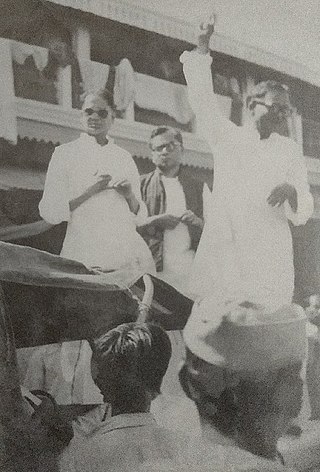
The Congress Socialist Party (CSP) was a socialist caucus within the Indian National Congress. It was founded in 1934 by Congress members who rejected what they saw as the anti-rational mysticism of Gandhi as well as the sectarian attitude of the Communist Party of India towards the Congress. Influenced by Fabianism as well as Marxism-Leninism, the CSP included advocates of armed struggle or sabotage (such as Yusuf Meherally, Jai Prakash Narayan, and Basawon Singh as well as those who insisted upon Ahimsa or Nonviolent resistance. The CSP advocated decentralized socialism in which co-operatives, trade unions, independent farmers, and local authorities would hold a substantial share of the economic power.
The Coordination Committee of Maoist Parties and Organizations of South Asia (CCOMPOSA) is an umbrella organization of various South Asian Maoist parties and movements and its purpose is to coordinate their activities throughout South Asia.

Puchalapalli Sundarayya (born Sundararami Reddy; 1 May 1913 – 19 May 1985), popularly known as Comrade PS, was an Indian Communist leader including of the peasant revolt in the former Hyderabad State of India, called the Telangana Rebellion and he was also one of the founding members of Communist Party of India (Marxist). He was so dedicated to the upliftment of the poor that he and his spouse chose not to have children, for the purpose of social service. He directly participated in Telangana armed struggle against the imperialism of the Nizam of Hyderabad. Sundarayya remained General Secretary of Communist Party of India (Marxist) until 1976.
Socialism in India is a political movement founded early in the 20th century, as a part of the broader movement to gain Indian independence from colonial rule. The movement grew quickly in popularity as it espoused the causes of India's farmers and labourers against the zamindars, the princely class and the landed gentry. After independence and until the early 1990s, socialism shaped some economic and social policies of the Indian government, although they mostly followed the principles of dirigisme. After this period, India moved towards a more market-based economy.
Communism in India has existed as a social or political ideology as well as a political movement since at least as early as the 1920s. In its early years, communist ideology was harshly suppressed through legal prohibitions and criminal prosecutions. Eventually, communist parties became ensconced in national party politics, sprouting several political offshoots.

The Marxist-Leninist Party of India , previously the Communist Party of India (Marxist-Leninist) Red Flag, is a communist party in India. The party is one of the most moderate factions of the wider Naxalite movement.
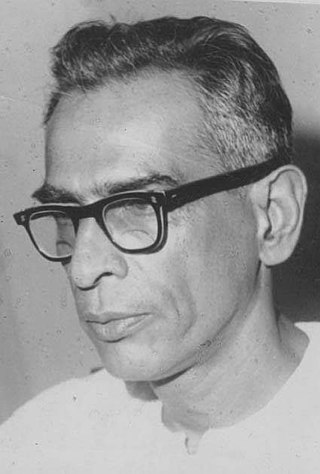
Hare Krishna Konar was an Indian Marxist revolutionary, a charismatic peasant leader and politician. Konar was a founding member of Communist Party of India (Marxist), and the leader to start the first land reforms and agrarian reforms in India as well as the chief architect of the West Bengal land redistribution. In the 1930s for making arms and bombs for the Jugantar group, he was deported to the Cellular Jail for 6 years at the age of 18 and there he took part in the first hunger strike and in 1935 he founded the Communist Consolidation and led the historical second hunger strike.
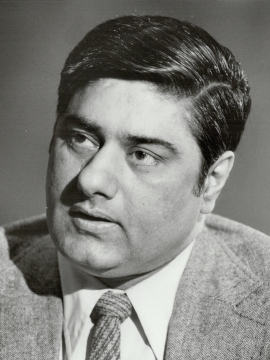
Hardial Bains was an Indo-Canadian microbiology lecturer, but was primarily known as the founder of a series of left-wing movements and parties foremost of which was the Communist Party of Canada (Marxist–Leninist). Presenting himself as staunchly anti-revisionist and pro-Stalinist, until his death, Bains acted as the spokesperson and ideological leader of the CPC (ML) — known in elections as the Marxist–Leninist Party of Canada. During his lifetime, Bains' outlook swung from supporting the Soviet Union under Joseph Stalin, to Mao Zedong's China, then later to Enver Hoxha's Albania. Shortly before he died, and abandoning his previous sharp criticisms of the country, Bains turned to Fidel Castro's Cuba for inspiration. Spending most of his life in Canada, Bains was also politically active in England, Ireland, United States and India.
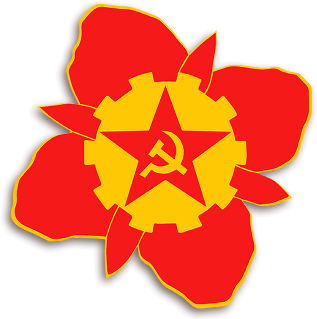
The Communist Party of Canada (Marxist–Leninist) is a Canadian federal political party founded by Hardial Bains in 1970. The CPC(M-L) has been registered with Elections Canada as the Marxist–Leninist Party of Canada (MLPC) since 1974 as the party is prohibited from using the Communist Party name in Canadian elections to avoid confusion among voters. The party developed separately and independently from the Communist Party of Canada (CPC), originating among students and intellectuals in Canada during the 1960s. After a period of alignment with Maoism and China, the CPC(M-L) pursued a Hoxhaist, pro-Albanian line until the early 1990s. At present, the party directs most of its public support to Cuba and North Korea.
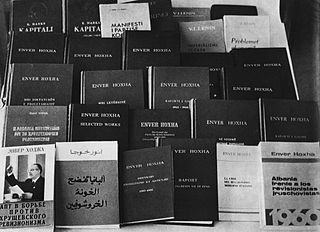
Hoxhaism is a variant of anti-revisionist Marxism–Leninism that developed in the late 1970s due to a split in the anti-revisionist movement, appearing after the ideological dispute between the Chinese Communist Party and the Party of Labour of Albania in 1978. The ideology is named after Enver Hoxha, a notable Albanian communist leader, who served as the First Secretary of the Party of Labour.
The Revolutionary Internationalist Movement (RIM) was an international communist organization founded in France in March 1984 by 17 various Maoist organisations around the world. It sought to "struggle for the formation of a Communist International of a new type, based on Marxism–Leninism–Maoism". The RIM appears to be defunct as are many of the founding organisations and many changed their names over the years, or have dropped active armed struggle.
The International Conference of Marxist–Leninist Parties and Organizations (ICMLPO) was an international grouping of political parties and organizations adhering to Mao Zedong Thought founded in 1998 by the Marxist-Leninist Party of Germany. It was organized by a Joint Coordination Group and met every two or three years. It ceased to exist in 2017.
Kulgam Assembly constituency is one of the 87 constituencies in the Jammu and Kashmir Legislative Assembly of Jammu and Kashmir a north state of India. Kulgam is also part of Baramulla Lok Sabha constituency.
References
- ↑ Mohanty, Manoranjan. Revolutionary Violence. A Study of the Maoist Movement in India . New Delhi: Sterling Publishers, 1977. p. 106-107.